Deck 5: Electric Current and Direct-Current Circuits
Question
Question
Question
Question
Question
Question
Question
Question
Question
Question
Question
Question
Question
Question
Question
Question
Question
Question
Question
Question
Question
Question
Question
Question
Question
Question
Question
Question
Question
Question
Question
Question
Question
Question
Question
Question
Question
Question
Question
Question
Question
Question
Question
Question
Question
Question
Question
Question
Question
Question
Question
Question
Question
Question
Question
Question
Question
Question
Question
Question
Question
Question
Question
Question
Question
Question
Question
Question
Question
Question
Question
Question
Question
Question
Question
Question
Question
Question
Question
Question

Unlock Deck
Sign up to unlock the cards in this deck!
Unlock Deck
Unlock Deck
1/160
Play
Full screen (f)
Deck 5: Electric Current and Direct-Current Circuits
1
If 4.7 * 1016 electrons pass a particular point in a wire every second, what is the current in the wire?
A) 4.7 mA
B) 7.5 A
C) 2.9 A
D) 7.5 mA
E) 0.29 A
A) 4.7 mA
B) 7.5 A
C) 2.9 A
D) 7.5 mA
E) 0.29 A
7.5 mA
2
For copper, = 8.93 g/cm3 and M = 63.5 g/mol. Assuming one free electron per copper atom, what is the drift velocity of electrons in a copper wire of radius 0.435 mm carrying a current of 5 A?
A) 5.43 *10-4 m/s
B) 2.11 * 10-4 m/s
C) 4.67 * 10-4 m/s
D) 6.21 * 10-4 m/s
E) 8.37 * 10-4 m/s
A) 5.43 *10-4 m/s
B) 2.11 * 10-4 m/s
C) 4.67 * 10-4 m/s
D) 6.21 * 10-4 m/s
E) 8.37 * 10-4 m/s
6.21 * 10-4 m/s
3
In a certain particle accelerator, a current of 800 A is carried by a 6.00-MeV proton beam that has a radius of 1.50 mm. The mass of a proton is 1.67 F* 10-27 kg. If the beam hits a target, how many protons hit the target in 5 s?
A) 2.50*1016
B) 6.78 * 1016
C) 5.68 * 1016
D) 1.37 * 1016
E) 3.71 * 1016
A) 2.50*1016
B) 6.78 * 1016
C) 5.68 * 1016
D) 1.37 * 1016
E) 3.71 * 1016
2.50*1016
4
In a certain particle accelerator, a current of 800 A is carried by a 6.00-MeV proton beam that has a radius of 1.50 mm. The mass of a proton is 1.67 *10-27 kg. How many protons per unit volume are in this beam?
A) 3.24 *1013 protons/m3
B) 7.76 * 1013 protons/m3
C) 1.57 * 1013 protons/m3
D) 2.09 *1013 protons/m3
E) 4.34 * 1013 protons/m3
A) 3.24 *1013 protons/m3
B) 7.76 * 1013 protons/m3
C) 1.57 * 1013 protons/m3
D) 2.09 *1013 protons/m3
E) 4.34 * 1013 protons/m3

Unlock Deck
Unlock for access to all 160 flashcards in this deck.
Unlock Deck
k this deck
5
Wire A, which is of the same length and material as wire B, has twice the diameter of wire B. If the resistance of wire B is R, what is the resistance of wire A?
A) R
B) 2R
C) R/2
D) 4R
E) R/4
A) R
B) 2R
C) R/2
D) 4R
E) R/4

Unlock Deck
Unlock for access to all 160 flashcards in this deck.
Unlock Deck
k this deck
6
Wire A, which is of the same material and cross-sectional area as wire B, is twice as long as wire B. If the resistance of wire B is R, what is the resistance of wire A?
A) R
B) 2R
C) R/2
D) 4R
E) R/4
A) R
B) 2R
C) R/2
D) 4R
E) R/4

Unlock Deck
Unlock for access to all 160 flashcards in this deck.
Unlock Deck
k this deck
7
The forward current for a pn-diode is given by  where I0 and V0 are constants. If I0 = 4 A and V0 = 1.5 V, what is the ratio of the current for V = 2 V to
where I0 and V0 are constants. If I0 = 4 A and V0 = 1.5 V, what is the ratio of the current for V = 2 V to
0)5 V?
A) 2.0
B) 4.0
C) 5.1
D) 6.2
E) 7.1
 where I0 and V0 are constants. If I0 = 4 A and V0 = 1.5 V, what is the ratio of the current for V = 2 V to
where I0 and V0 are constants. If I0 = 4 A and V0 = 1.5 V, what is the ratio of the current for V = 2 V to0)5 V?
A) 2.0
B) 4.0
C) 5.1
D) 6.2
E) 7.1

Unlock Deck
Unlock for access to all 160 flashcards in this deck.
Unlock Deck
k this deck
8
If 4.0 * 1018 electrons and 1.5 * 1018 protons move in opposite directions past a given cross section of a hydrogen discharge tube every second, the average current in the tube is
A) 0.40 A
B) 0.56 A
C) 0.88 A
D) 1.5 A
E) 4.0 A
A) 0.40 A
B) 0.56 A
C) 0.88 A
D) 1.5 A
E) 4.0 A

Unlock Deck
Unlock for access to all 160 flashcards in this deck.
Unlock Deck
k this deck
9
In a certain particle accelerator, a current of 300 A is carried by a 4.00-MeV proton beam that has a radius of 1.30 mm. The mass of a proton is 1.67 * 10-27 kg. What is the number of protons per unit volume in this beam?
A) 3.64 *1013 protons/m3
B) 2.76 *1013 protons/m3
C) 1.27 * 1013 protons/m3
D) 5.98* 1013 protons/m3
E) 4.17 * 1013 protons/m3
A) 3.64 *1013 protons/m3
B) 2.76 *1013 protons/m3
C) 1.27 * 1013 protons/m3
D) 5.98* 1013 protons/m3
E) 4.17 * 1013 protons/m3

Unlock Deck
Unlock for access to all 160 flashcards in this deck.
Unlock Deck
k this deck
10
The drift velocity of an electron in a wire varies
A) directly with the number of charge carriers per unit volume.
B) directly with the cross-sectional area of the conducting wire.
C) directly with the charge carried by it.
D) directly with the current flowing in the conducting wire.
E) inversely with the current flowing in the conducting wire.
A) directly with the number of charge carriers per unit volume.
B) directly with the cross-sectional area of the conducting wire.
C) directly with the charge carried by it.
D) directly with the current flowing in the conducting wire.
E) inversely with the current flowing in the conducting wire.

Unlock Deck
Unlock for access to all 160 flashcards in this deck.
Unlock Deck
k this deck
11
The resistivity of any given metal
A) depends on its temperature.
B) varies linearly with temperature.
C) is the proportionality constant between the resistance, R, and the ratio of the length, L, to the cross-sectional area, A, of a wire made of the metal.
D) has units of ohm-meter.
E) is described by all of the above.
A) depends on its temperature.
B) varies linearly with temperature.
C) is the proportionality constant between the resistance, R, and the ratio of the length, L, to the cross-sectional area, A, of a wire made of the metal.
D) has units of ohm-meter.
E) is described by all of the above.

Unlock Deck
Unlock for access to all 160 flashcards in this deck.
Unlock Deck
k this deck
12
The current in a wire varies with time according to the relation
I = 40 cos(10 t)
Where I is in amperes and t is in seconds. The number of coulombs that pass a cross section of the wire in the time interval between t = 0 and t = 1/20 s is
A) 2
B) 4
C) 40
D) 4
E) zero
I = 40 cos(10 t)
Where I is in amperes and t is in seconds. The number of coulombs that pass a cross section of the wire in the time interval between t = 0 and t = 1/20 s is
A) 2
B) 4
C) 40
D) 4
E) zero

Unlock Deck
Unlock for access to all 160 flashcards in this deck.
Unlock Deck
k this deck
13
Which of the following statements is false?
A) An electric field is needed to produce an electric current.
B) A potential difference between two points is needed to produce an electric current.
C) For a steady current to flow in a wire, the wire must be part of a closed circuit.
D) The electric field is constant along all parts of the circuit when a steady current is flowing.
E) The electric current in a wire is proportional to the drift velocity of the charges.
A) An electric field is needed to produce an electric current.
B) A potential difference between two points is needed to produce an electric current.
C) For a steady current to flow in a wire, the wire must be part of a closed circuit.
D) The electric field is constant along all parts of the circuit when a steady current is flowing.
E) The electric current in a wire is proportional to the drift velocity of the charges.

Unlock Deck
Unlock for access to all 160 flashcards in this deck.
Unlock Deck
k this deck
14
The same potential difference is applied across two wires. Wire A carries twice the current of wire B. If the resistance of wire B is R, what is the resistance of wire A?
A) R
B) 2R
C) R/2
D) 4R
E) R/4
A) R
B) 2R
C) R/2
D) 4R
E) R/4

Unlock Deck
Unlock for access to all 160 flashcards in this deck.
Unlock Deck
k this deck
15
The seemingly instantaneous propagation of electric current in a wire when a switch is closed can be understood in terms of
A) the propagation of an electric field down the wire with nearly the speed of light.
B) the acquisition of the drift velocities of the free electrons almost immediately.
C) a very large number of charges slowly drifting down the wire.
D) the replacement of charge flowing out of the wire at one end by charge entering the wire at the other end.
E) all of the above
A) the propagation of an electric field down the wire with nearly the speed of light.
B) the acquisition of the drift velocities of the free electrons almost immediately.
C) a very large number of charges slowly drifting down the wire.
D) the replacement of charge flowing out of the wire at one end by charge entering the wire at the other end.
E) all of the above

Unlock Deck
Unlock for access to all 160 flashcards in this deck.
Unlock Deck
k this deck
16
You want to use a metal bar as a resistor. Its dimensions are 2 by 4 by 10 units. To get the smallest resistance from this bar, you should attach leads to the two opposite sides that have the dimensions of
A) 2 by 4 units.
B) 2 by 10 units.
C) 4 by 10 units.
D) any number of units because all connections give the same resistance.
E) None of these is correct.
A) 2 by 4 units.
B) 2 by 10 units.
C) 4 by 10 units.
D) any number of units because all connections give the same resistance.
E) None of these is correct.

Unlock Deck
Unlock for access to all 160 flashcards in this deck.
Unlock Deck
k this deck
17
Which of the following statements is false?
A) When there is no electric field in a wire, the free electrons move in random directions with speeds of the order of 106 m/s.
B) By convention, electrons move in the direction opposite to the direction of current.
C) In the absence of an electric field, the average velocity of the electrons in a wire is very large.
D) The drift velocity of electrons in a typical metal is very small.
E) The motion of the free electrons in a metal is similar to that of the molecules of a gas.
A) When there is no electric field in a wire, the free electrons move in random directions with speeds of the order of 106 m/s.
B) By convention, electrons move in the direction opposite to the direction of current.
C) In the absence of an electric field, the average velocity of the electrons in a wire is very large.
D) The drift velocity of electrons in a typical metal is very small.
E) The motion of the free electrons in a metal is similar to that of the molecules of a gas.

Unlock Deck
Unlock for access to all 160 flashcards in this deck.
Unlock Deck
k this deck
18
In a certain particle accelerator, a current of 300 A is carried by a 4.00-MeV proton beam that has a radius of 1.30 mm. The mass of a proton is 1.67 *10-27 kg. If the beam hits a target, how many protons hit the target in 3 s?
A) 1.55 *1015
B) 8.64 * 1015
C) 3.42 * 1015
D) 4.29 * 1015
E) None of these is correct.
A) 1.55 *1015
B) 8.64 * 1015
C) 3.42 * 1015
D) 4.29 * 1015
E) None of these is correct.

Unlock Deck
Unlock for access to all 160 flashcards in this deck.
Unlock Deck
k this deck
19
For copper, = 8.93 g/cm3 and M = 63.5 g/mol. Assuming one free electron per copper atom, what is the drift velocity of electrons in a copper wire of radius 0.625 mm carrying a current of 3 A?
A) 3.54 * 10-4 m/s
B) 1.80 *10-4 m/s
C) 4.26 * 10-4 m/s
D) 7.52 *10-4 m/s
E) 2.46 * 10-4 m/s
A) 3.54 * 10-4 m/s
B) 1.80 *10-4 m/s
C) 4.26 * 10-4 m/s
D) 7.52 *10-4 m/s
E) 2.46 * 10-4 m/s

Unlock Deck
Unlock for access to all 160 flashcards in this deck.
Unlock Deck
k this deck
20
The current in a wire varies with time according to the relation
I = 4 + 3t2
Where I is in amperes and t is in seconds. The number of coulombs of charge that pass a cross section of the wire between t = 3 s and t = 5 s is
A) 12
B) 48
C) 52
D) 106
E) 305
I = 4 + 3t2
Where I is in amperes and t is in seconds. The number of coulombs of charge that pass a cross section of the wire between t = 3 s and t = 5 s is
A) 12
B) 48
C) 52
D) 106
E) 305

Unlock Deck
Unlock for access to all 160 flashcards in this deck.
Unlock Deck
k this deck
21
A potential difference V = 25 V is applied across a wire of length L = 10.0 m and uniform diameter. The electric field throughout the wire is
A) 250 V/m
B) 2.5 V/m
C) 0.4 V/m
D) 0.25 V/m
E) zero
A) 250 V/m
B) 2.5 V/m
C) 0.4 V/m
D) 0.25 V/m
E) zero

Unlock Deck
Unlock for access to all 160 flashcards in this deck.
Unlock Deck
k this deck
22
A wire 10 m long with a diameter of 1.0 mm has a resistance of 5.0 . The resistance of a second wire made of the same material, but 3.0 m long with a diameter of 4.0 mm, is approximately
A) 0.38
B) 0.094
C) 0.75
D) 1.7
E) 0.27 k
A) 0.38
B) 0.094
C) 0.75
D) 1.7
E) 0.27 k

Unlock Deck
Unlock for access to all 160 flashcards in this deck.
Unlock Deck
k this deck
23
A wire of length L = 6.0 m has a uniform diameter d = 3.0 mm. When an electric field of E = 0.25 V/m is applied to the wire, the current is 1.5 A. The resistivity of the wire is
A) 1.18 *10-6 .m
B) 3.53 *10-6 .m
C) 2.81 * 10-7 .m
D) 7.03 *10-8 .m
E) 2.21 * 10-7 .m
A) 1.18 *10-6 .m
B) 3.53 *10-6 .m
C) 2.81 * 10-7 .m
D) 7.03 *10-8 .m
E) 2.21 * 10-7 .m

Unlock Deck
Unlock for access to all 160 flashcards in this deck.
Unlock Deck
k this deck
24
By what percentage does the resistance of a copper wire ( = 3.9 *10-3/K) increase when its temperature increases from 20 to 75ºC?
A) 11%
B) 14%
C) 22%
D) 31%
E) 57%
A) 11%
B) 14%
C) 22%
D) 31%
E) 57%

Unlock Deck
Unlock for access to all 160 flashcards in this deck.
Unlock Deck
k this deck
25
A wire of length L = 3.0 m. When an electric field of E = 0.5 V/m is applied to the wire, the current is 1.5 A. The resistance of the wire is
A) 0.53
B) 8.0
C) 5.33
D) 0.13
E) 1.0
A) 0.53
B) 8.0
C) 5.33
D) 0.13
E) 1.0

Unlock Deck
Unlock for access to all 160 flashcards in this deck.
Unlock Deck
k this deck
26
 If a current of 2.0 A is flowing from point a to point b, the potential difference between the points is
If a current of 2.0 A is flowing from point a to point b, the potential difference between the points isA) 6 V
B) 8 V
C) 14 V
D) 20 V
E) 22 V

Unlock Deck
Unlock for access to all 160 flashcards in this deck.
Unlock Deck
k this deck
27
Use the diagram below for the next two problems: 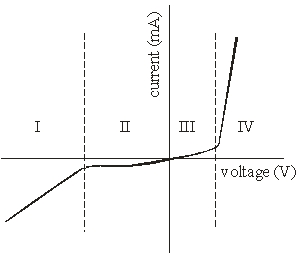
The diagram shows the current versus voltage for a diode. The region which has the highest resistance is
A) I
B) II
C) III
D) IV
E) II and III

The diagram shows the current versus voltage for a diode. The region which has the highest resistance is
A) I
B) II
C) III
D) IV
E) II and III

Unlock Deck
Unlock for access to all 160 flashcards in this deck.
Unlock Deck
k this deck
28
Two pieces of copper wire have the same length, but wire A has a square cross section of width s whereas wire B has a circular cross section of diameter s. Which of the following statements is true?
A) The resistance of both wires is the same.
B) The resistivity of both wires is the same.
C) Both the resistance and the resistivity of A and B are the same.
D) The resistance of A is greater than that of B.
E) The resistivity of A is greater than that of B.
A) The resistance of both wires is the same.
B) The resistivity of both wires is the same.
C) Both the resistance and the resistivity of A and B are the same.
D) The resistance of A is greater than that of B.
E) The resistivity of A is greater than that of B.

Unlock Deck
Unlock for access to all 160 flashcards in this deck.
Unlock Deck
k this deck
29
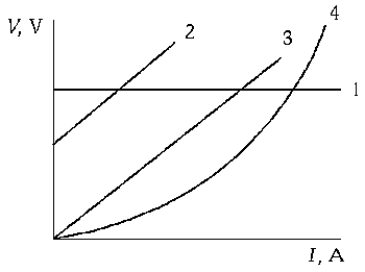 The curves on the graph represent the current versus the potential difference for various conductors. The conductor whose behavior is described by Ohm's law is
The curves on the graph represent the current versus the potential difference for various conductors. The conductor whose behavior is described by Ohm's law isA) 1
B) 2
C) 3
D) 4
E) None of these is correct.

Unlock Deck
Unlock for access to all 160 flashcards in this deck.
Unlock Deck
k this deck
30
A potential difference of 120 V produces a current of 8.0 A in the heating element of a toaster. What is the resistance of this heating element while the toaster is carrying this current?
A) 6.7 * 10-2
B) 15
C) 0.96 k
D) 67
E) 30
A) 6.7 * 10-2
B) 15
C) 0.96 k
D) 67
E) 30

Unlock Deck
Unlock for access to all 160 flashcards in this deck.
Unlock Deck
k this deck
31
A wire of length L and resistance R is now drawn out by pulling such that its new length is 1.5L. What is its new resistance? (Assume the density remains constant.)
A) 1.00 R
B) 1.50 R
C) 2.25 R
D) 5.06 R
E) 4.44 * 10-1 R
A) 1.00 R
B) 1.50 R
C) 2.25 R
D) 5.06 R
E) 4.44 * 10-1 R

Unlock Deck
Unlock for access to all 160 flashcards in this deck.
Unlock Deck
k this deck
32
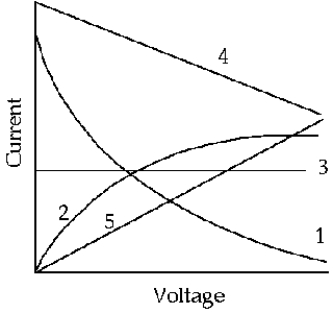 The curve that best illustrates the relation between the current in a metallic conductor and the potential difference between its terminals is
The curve that best illustrates the relation between the current in a metallic conductor and the potential difference between its terminals isA) 1
B) 2
C) 3
D) 4
E) 5

Unlock Deck
Unlock for access to all 160 flashcards in this deck.
Unlock Deck
k this deck
33
By what percentage does the resistance of a copper wire ( = 3.9 *10-3/K) increase when its temperature increases from 20ºC to 100ºC?
A) 11%
B) 14%
C) 23%
D) 31%
E) 57%
A) 11%
B) 14%
C) 23%
D) 31%
E) 57%

Unlock Deck
Unlock for access to all 160 flashcards in this deck.
Unlock Deck
k this deck
34
A 10-gauge copper wire (diameter = 2.588 mm, = 1.7 * 10-8 · m) has a total resistance of 0.32 . How long is the wire?
A) 4.0 * 102 m
B) 1.6 km
C) 99 m
D) 31 m
E) 65 m
A) 4.0 * 102 m
B) 1.6 km
C) 99 m
D) 31 m
E) 65 m

Unlock Deck
Unlock for access to all 160 flashcards in this deck.
Unlock Deck
k this deck
35
Use the diagram below for the next two problems: 
The diagram shows the current versus voltage for a diode. The region which has the least resistance is
A) I
B) II
C) III
D) IV
E) A diode does not have any resistance.

The diagram shows the current versus voltage for a diode. The region which has the least resistance is
A) I
B) II
C) III
D) IV
E) A diode does not have any resistance.

Unlock Deck
Unlock for access to all 160 flashcards in this deck.
Unlock Deck
k this deck
36
A wire of length L = 5.0 m and uniform diameter has an electric field of E = 4.0 V/m throughout the wire. The potential difference across the wire is
A) 1.25 V
B) 0.80 V
C) 20.0 V
D) 3.20 V
E) zero
A) 1.25 V
B) 0.80 V
C) 20.0 V
D) 3.20 V
E) zero

Unlock Deck
Unlock for access to all 160 flashcards in this deck.
Unlock Deck
k this deck
37
Consider a conductor for which
R = the resistance in ohms,
= the resistivity,
A = the cross sectional area in m2, and
L = the length in meters.
Which of the following is an expression for ?
A) RL/A
B) RLA
C) R/(LA)
D) LA/R
E) AR/L
R = the resistance in ohms,
= the resistivity,
A = the cross sectional area in m2, and
L = the length in meters.
Which of the following is an expression for ?
A) RL/A
B) RLA
C) R/(LA)
D) LA/R
E) AR/L

Unlock Deck
Unlock for access to all 160 flashcards in this deck.
Unlock Deck
k this deck
38
Two copper wires have the same volume, but wire 2 is 20% longer than wire 1. The ratio of the resistances of the two wires R2/R1 is
A) 1.2
B) 0.83
C) 1.1
D) 0.91
E) 1.4
A) 1.2
B) 0.83
C) 1.1
D) 0.91
E) 1.4

Unlock Deck
Unlock for access to all 160 flashcards in this deck.
Unlock Deck
k this deck
39
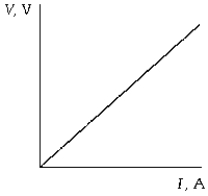 The graph shows the potential difference across a resistor as a function of the current through the resistor. The slope of the resulting curve represents
The graph shows the potential difference across a resistor as a function of the current through the resistor. The slope of the resulting curve representsA) power.
B) resistance.
C) emf.
D) charge.
E) work per unit charge.

Unlock Deck
Unlock for access to all 160 flashcards in this deck.
Unlock Deck
k this deck
40
Two copper wires have the same volume, but wire 2 is 10% longer than wire 1. The ratio of the resistances of the two wires R2/R1 is
A) 1.2
B) 1.1
C) 0.82
D) 0.91
E) 1.0
A) 1.2
B) 1.1
C) 0.82
D) 0.91
E) 1.0

Unlock Deck
Unlock for access to all 160 flashcards in this deck.
Unlock Deck
k this deck
41
A heating element made of nichrome wire (temperature coefficient of resistivity,
= 0.400 *10-3 K-1) is connected to a source. When it has just been turned on and its temperature is 20ºC, it dissipates 960 W of power. What power is dissipated when its temperature has risen to 300ºC?
A) 1.1* 103 W
B) 9.6 *102 W
C) 8.6 * 102 W
D) 8.6 * 103 W
E) 1.1 *102 W
= 0.400 *10-3 K-1) is connected to a source. When it has just been turned on and its temperature is 20ºC, it dissipates 960 W of power. What power is dissipated when its temperature has risen to 300ºC?
A) 1.1* 103 W
B) 9.6 *102 W
C) 8.6 * 102 W
D) 8.6 * 103 W
E) 1.1 *102 W

Unlock Deck
Unlock for access to all 160 flashcards in this deck.
Unlock Deck
k this deck
42
Since you cannot afford expensive cable to hook up between your loudspeaker and music amplifier, you try some common 14-gauge (diameter = 1.628 mm) copper wire. If the total length of the wire (there and back) used for each speaker to amplifier hookup was 10 m, then calculate the resistance in the wire for one channel. ( (Cu) = 1.7 *10-8 /m)
A) 2.6 *10-2
B) 2.0 *10-2
C) 4.1 *10-3
D) 8.2 *10-2
E) 1.6 *10-1
A) 2.6 *10-2
B) 2.0 *10-2
C) 4.1 *10-3
D) 8.2 *10-2
E) 1.6 *10-1

Unlock Deck
Unlock for access to all 160 flashcards in this deck.
Unlock Deck
k this deck
43
A wire of length L, cross sectional area A and resistance R is now drawn out by pulling such that its new resistance is 25R. What is its new cross sectional area? (Assume the density remains constant.)
A) 1.00 * 10-1 A
B) 6.67 *10-1 A
C) 4.00 * 10-1 A
D) 2.50*10-1 A
E) 2.00 *10-1 A
A) 1.00 * 10-1 A
B) 6.67 *10-1 A
C) 4.00 * 10-1 A
D) 2.50*10-1 A
E) 2.00 *10-1 A

Unlock Deck
Unlock for access to all 160 flashcards in this deck.
Unlock Deck
k this deck
44
If electric energy costs 10 cents per kilowatt-hour, how many cents does it cost to keep a 660-W toaster in steady operation for 30 min?
A) 15 cents
B) 12 cents
C) 6.9 cents
D) 3.3 cents
E) 1.7 cents
A) 15 cents
B) 12 cents
C) 6.9 cents
D) 3.3 cents
E) 1.7 cents

Unlock Deck
Unlock for access to all 160 flashcards in this deck.
Unlock Deck
k this deck
45
A motor running from a 220-V line is lifting a mass of 35 kg against Earth's gravity at a constant speed of 6.0 m/s. If we assume 100% efficiency, the current required is
A) 0.27 A
B) 9.4 A
C) 7.7 A
D) 3.3 A
E) 4.7 A
A) 0.27 A
B) 9.4 A
C) 7.7 A
D) 3.3 A
E) 4.7 A

Unlock Deck
Unlock for access to all 160 flashcards in this deck.
Unlock Deck
k this deck
46
Suppose instead of using a 12-gauge (diameter = 2.05 mm) solid copper cable you made a hollow copper cable of outer diameter 2.59 mm (10-gauge) and inner diameter
1)29 mm (16-gauge). Calculate the length of hollow cable that would give the same resistance as 1 m of 12-gauge solid cable. Use (Cu) = 1.7 *10-8 /m.
A) 0.402 m
B) 2.48 m
C) 0.833 m
D) 1.44 m
E) 1.20 m
1)29 mm (16-gauge). Calculate the length of hollow cable that would give the same resistance as 1 m of 12-gauge solid cable. Use (Cu) = 1.7 *10-8 /m.
A) 0.402 m
B) 2.48 m
C) 0.833 m
D) 1.44 m
E) 1.20 m

Unlock Deck
Unlock for access to all 160 flashcards in this deck.
Unlock Deck
k this deck
47
You can pay a lot of money for fancy connecting cables between your audio/video equipment components. Some of the more expensive ones use silver wire rather than copper. Calculate the difference in resistance between a silver and a copper cable with the same 12-gauge diameter of 2.05 mm and length of 3 m (hence total length = 6m). (Use (Cu) = 1.7 * 10-8 /m and (Ag) = 1.6 * 10-8 /m. Unfortunately (or fortunately), there are many other factors that go into making an interconnect cable than simple resistance considerations.)
A) 4.1 * 10-3
B) 1.8 * 10-3
C) 2.9 * 10-2
D) 9.0 * 10-4
E) 3.1 * 10-2
A) 4.1 * 10-3
B) 1.8 * 10-3
C) 2.9 * 10-2
D) 9.0 * 10-4
E) 3.1 * 10-2

Unlock Deck
Unlock for access to all 160 flashcards in this deck.
Unlock Deck
k this deck
48
The power dissipated in each of two resistors is the same. The potential drop across resistor A is twice that across resistor B. If the resistance of resistor B is R, what is the resistance of A?
A) R
B) 2R
C) R/2
D) 4R
E) R/4
A) R
B) 2R
C) R/2
D) 4R
E) R/4

Unlock Deck
Unlock for access to all 160 flashcards in this deck.
Unlock Deck
k this deck
49
An immersion heater of negligible mass draws a current of 7.5 A from a source with a potential difference of 120 V. The heater is in 0.950 m3 of water. The initial temperature of the water is 12.5ºC. How much time does it take to increase the temperature of the water to 27.5ºC? Neglect any heat loss. One calorie is equivalent to 4.18 J.
A) 4.7 *104 s
B) 3.3 * 104 s
C) 1.1 * 104 s
D) 1.6 *104 s
E) None of these is correct.
A) 4.7 *104 s
B) 3.3 * 104 s
C) 1.1 * 104 s
D) 1.6 *104 s
E) None of these is correct.

Unlock Deck
Unlock for access to all 160 flashcards in this deck.
Unlock Deck
k this deck
50
You connect two similar heating coils in series on a constant-voltage line. When you later connect them in parallel to the same line, the heat developed per minute, compared with the former rate, is approximately
A) the same.
B) twice as great.
C) one-half as much.
D) four times as great.
E) one-fourth as much.
A) the same.
B) twice as great.
C) one-half as much.
D) four times as great.
E) one-fourth as much.

Unlock Deck
Unlock for access to all 160 flashcards in this deck.
Unlock Deck
k this deck
51
A wire of length L and resistance R is now drawn out by pulling such that its new resistance is 15R. What is its new length? (Assume the density remains constant.)
A) 1.50 L
B) 6.67 * 10-1 L
C) 2.25 L
D) 3.87 L
E) 2.58 * 10-1 L
A) 1.50 L
B) 6.67 * 10-1 L
C) 2.25 L
D) 3.87 L
E) 2.58 * 10-1 L

Unlock Deck
Unlock for access to all 160 flashcards in this deck.
Unlock Deck
k this deck
52
An energy efficient light bulb uses 15 W of power for an equivalent light output of a
60 W incandescent light bulb. How much money do you save each month by using the energy efficient light bulb instead of the incandescent light bulb for 6 hours a day? Assume that 1 kW.hr costs 14 cents and there are 30 days in one month.
A) $0.39
B) $0.76
C) $1.51
D) $0.57
E) $1.13
60 W incandescent light bulb. How much money do you save each month by using the energy efficient light bulb instead of the incandescent light bulb for 6 hours a day? Assume that 1 kW.hr costs 14 cents and there are 30 days in one month.
A) $0.39
B) $0.76
C) $1.51
D) $0.57
E) $1.13

Unlock Deck
Unlock for access to all 160 flashcards in this deck.
Unlock Deck
k this deck
53
A resistor develops heat at the rate of 20 W when the potential difference across its ends is 30 V. The resistance of the resistor is approximately
A) 45
B) 5.5
C) 30
D) 13
E) 2
A) 45
B) 5.5
C) 30
D) 13
E) 2

Unlock Deck
Unlock for access to all 160 flashcards in this deck.
Unlock Deck
k this deck
54
A resistor carries a current I. The power dissipated in the resistor is P. What is the power dissipated if the same resistor carries current 3I?
A) P
B) 3P
C) P/3
D) 9P
E) P/P
A) P
B) 3P
C) P/3
D) 9P
E) P/P

Unlock Deck
Unlock for access to all 160 flashcards in this deck.
Unlock Deck
k this deck
55
A wire of length L and resistance R is cut into 4 equal pieces. If the 4 pieces are now twisted together to make a wire of length L/4, what is the new resistance of the shorter wire combination?
A) R/16
B) R/4
C) R
D) 4R
E) 16R
A) R/16
B) R/4
C) R
D) 4R
E) 16R

Unlock Deck
Unlock for access to all 160 flashcards in this deck.
Unlock Deck
k this deck
56
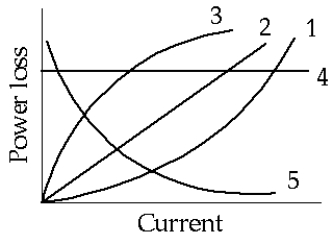 The curve that best represents the power loss in a resistor is
The curve that best represents the power loss in a resistor isA) 1
B) 2
C) 3
D) 4
E) 5

Unlock Deck
Unlock for access to all 160 flashcards in this deck.
Unlock Deck
k this deck
57
An energy efficient light bulb uses 15 W of power for an equivalent light output of a
60 W incandescent light bulb. How much energy is saved each month by using the energy efficient light bulb instead of the incandescent light bulb for 4 hours a day? Assume that there are 30 days in one month.
A) 5.4 kW.hr
B) 1.35 kW.hr
C) 21.6 kW.hr
D) 1.8 kW.hr
E) 7.2 kW.hr
60 W incandescent light bulb. How much energy is saved each month by using the energy efficient light bulb instead of the incandescent light bulb for 4 hours a day? Assume that there are 30 days in one month.
A) 5.4 kW.hr
B) 1.35 kW.hr
C) 21.6 kW.hr
D) 1.8 kW.hr
E) 7.2 kW.hr

Unlock Deck
Unlock for access to all 160 flashcards in this deck.
Unlock Deck
k this deck
58
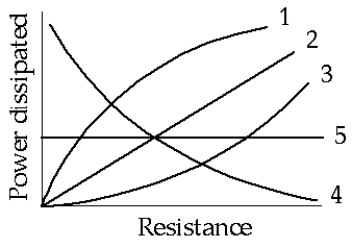 A variable resistance is connected across the terminals of a storage battery. The curve that might represent the power dissipated in the resistance as a function of the magnitude of the resistance is
A variable resistance is connected across the terminals of a storage battery. The curve that might represent the power dissipated in the resistance as a function of the magnitude of the resistance isA) 1
B) 2
C) 3
D) 4
E) 5

Unlock Deck
Unlock for access to all 160 flashcards in this deck.
Unlock Deck
k this deck
59
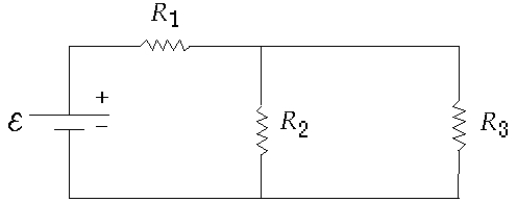 A comparison of the power losses (P1, P2, or P3) in the resistors of the circuit in the diagram shows that, if R1 = R2 = R3,
A comparison of the power losses (P1, P2, or P3) in the resistors of the circuit in the diagram shows that, if R1 = R2 = R3,A) 4P1 = P2 = P3
B) P1 = 2P2 + 2P3
C) P1 = P2 = P3
D) P1 = (1/2)P2 = (1/2)P3
E) P1 = P2 + P3

Unlock Deck
Unlock for access to all 160 flashcards in this deck.
Unlock Deck
k this deck
60
An electric motor drives a pump that lifts water from a well that is 11.9 m deep and then delivers the water through a hose at a rate of 180 L/min and a speed of 21.0 m/s. If we assume 100% efficiency and ignore viscosity, the current drawn by the motor from a 220-V source is
A) 4.6 A
B) 7.2 A
C) 6.0 A
D) 1.0 *103 A
E) 2.3 A
A) 4.6 A
B) 7.2 A
C) 6.0 A
D) 1.0 *103 A
E) 2.3 A

Unlock Deck
Unlock for access to all 160 flashcards in this deck.
Unlock Deck
k this deck
61
 In the circuit element shown, the current through the 6- resistor is approximately
In the circuit element shown, the current through the 6- resistor is approximatelyA) 1.0 A
B) 2.0 A
C) 0.40 A
D) 0.67 A
E) 1.3 A

Unlock Deck
Unlock for access to all 160 flashcards in this deck.
Unlock Deck
k this deck
62
A 12-V car battery may supply 60 A for 2.5 s in order for the starter motor to start the engine. Calculate how much electrical energy has been used.
A) 1.8 * 103 J
B) 2.2* 104 J
C) 7.2 * 102 J
D) 3.6 * 103 J
E) 4.5 * 103 J
A) 1.8 * 103 J
B) 2.2* 104 J
C) 7.2 * 102 J
D) 3.6 * 103 J
E) 4.5 * 103 J

Unlock Deck
Unlock for access to all 160 flashcards in this deck.
Unlock Deck
k this deck
63
A resistor of 2 and another of 3 are connected in parallel, and this combination is joined in series with a 4- resistor across a battery. If the current in the 2- resistor is 2.0 A, the potential drop across the 3- resistor is
A) 2.4 V
B) 1.2 V
C) 6.0 V
D) 4.0 V
E) 8.0 V
A) 2.4 V
B) 1.2 V
C) 6.0 V
D) 4.0 V
E) 8.0 V

Unlock Deck
Unlock for access to all 160 flashcards in this deck.
Unlock Deck
k this deck
64
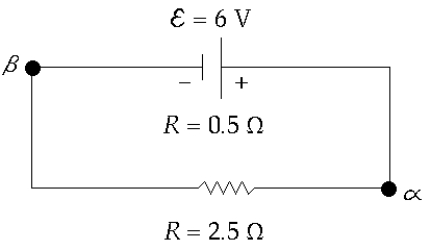 The circuit in the figure contains a battery and a resistor in series. Which of the following statements is not true?
The circuit in the figure contains a battery and a resistor in series. Which of the following statements is not true?A) The current in the circuit is 2 A.
B) Point is at a higher potential than point , and V = 5 V.
C) The battery is supplying energy to the circuit at the rate of 6 W.
D) The rate of heating in the external resistor is 10 W.
E) The battery is being discharged.

Unlock Deck
Unlock for access to all 160 flashcards in this deck.
Unlock Deck
k this deck
65
A storage battery with emf 6.4 V and internal resistance 0.080 is being charged by a current of 15 A. The power loss in internal heating of the battery is
A) 18 W
B) 96 W
C) 1.2 W
D) 80 W
E) 0.11 kW
A) 18 W
B) 96 W
C) 1.2 W
D) 80 W
E) 0.11 kW

Unlock Deck
Unlock for access to all 160 flashcards in this deck.
Unlock Deck
k this deck
66
Two resistors are connected in series across a potential difference. If the current carried by resistor A is I, what is the current carried by B?
A) I
B) 2I
C) I/2
D) 4I
E) I/4
A) I
B) 2I
C) I/2
D) 4I
E) I/4

Unlock Deck
Unlock for access to all 160 flashcards in this deck.
Unlock Deck
k this deck
67
Two resistors R1 and R2 are connected in parallel, and this combination is connected in series with a third resistor R3. If R1 = 5.0 , R2 = 2.0 , and R3 = 6.0 , what is the equivalent resistance of this combination?
A) 0.3l
B) 3.2
C) 6.7
D) 7.4
E) 13
A) 0.3l
B) 3.2
C) 6.7
D) 7.4
E) 13

Unlock Deck
Unlock for access to all 160 flashcards in this deck.
Unlock Deck
k this deck
68
You leave your 120-W light bulb on in your room by mistake while you are at school for 8.5 hours. If the price of electrical energy is $0.085 per kilowatt-hour, how much did it cost you?
A) $0.082
B) $0.075
C) $0.065
D) $0.087
E) $0.078
A) $0.082
B) $0.075
C) $0.065
D) $0.087
E) $0.078

Unlock Deck
Unlock for access to all 160 flashcards in this deck.
Unlock Deck
k this deck
69
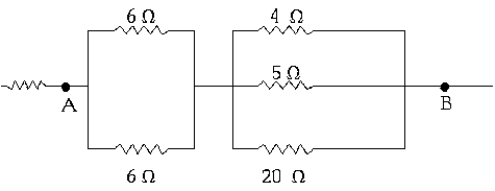 A current of 1.2 A flows from A to B. Therefore, the magnitude of the potential difference between points A and B is approximately
A current of 1.2 A flows from A to B. Therefore, the magnitude of the potential difference between points A and B is approximatelyA) 1.0 V
B) 4.2 V
C) 4.6 V
D) 6.0 V
E) 20 V

Unlock Deck
Unlock for access to all 160 flashcards in this deck.
Unlock Deck
k this deck
70
A 6-V storage battery supplies energy to a simple circuit at the constant rate of 48 W. The resistance of the circuit is
A) 8
B)
C) 3/2
D) 4/3
E) 3/4
A) 8
B)

C) 3/2
D) 4/3
E) 3/4

Unlock Deck
Unlock for access to all 160 flashcards in this deck.
Unlock Deck
k this deck
71
If it takes you 5 minutes to dry your hair using a 1200-W hairdryer plugged into a
120-V power outlet, how many Coulombs of charge pass through your hair dryer?
A) 120 C
B) 300 C
C) 60.0 C
D) 1.00 C
E) 5.00 C
120-V power outlet, how many Coulombs of charge pass through your hair dryer?
A) 120 C
B) 300 C
C) 60.0 C
D) 1.00 C
E) 5.00 C

Unlock Deck
Unlock for access to all 160 flashcards in this deck.
Unlock Deck
k this deck
72
The total charge flowing per hour past a given point in a piece of electrical equipment rated at 550 kW and 110 V is
A) 1.8* 107 C
B) 3.0 * 104 C
C) 3.3 * 104 C
D) 2.4 *103 C
E) impossible to determine without more information.
A) 1.8* 107 C
B) 3.0 * 104 C
C) 3.3 * 104 C
D) 2.4 *103 C
E) impossible to determine without more information.

Unlock Deck
Unlock for access to all 160 flashcards in this deck.
Unlock Deck
k this deck
73
A current of 0.50 A passes through a lamp with a resistance of 600 . The power supplied to this lamp is
A) 2.0 W
B) 0.10 kW
C) 0.12 kW
D) 0.15 kW
E) 0.30 kW
A) 2.0 W
B) 0.10 kW
C) 0.12 kW
D) 0.15 kW
E) 0.30 kW

Unlock Deck
Unlock for access to all 160 flashcards in this deck.
Unlock Deck
k this deck
74
An electric generator supplies power as a function of time according to the expression
P(t) = 2t + 3t2
Where the units are SI. The electric energy provided by the generator between t = 0 and t = 1 s is
A) 1.8 J
B) 2.0 J
C) 2.5 J
D) 5.0 J
E) 8.0 J
P(t) = 2t + 3t2
Where the units are SI. The electric energy provided by the generator between t = 0 and t = 1 s is
A) 1.8 J
B) 2.0 J
C) 2.5 J
D) 5.0 J
E) 8.0 J

Unlock Deck
Unlock for access to all 160 flashcards in this deck.
Unlock Deck
k this deck
75
Which of these five terms is most unlike the others?
A) electromotive force
B) voltage
C) potential difference
D) current
E) electric potential
A) electromotive force
B) voltage
C) potential difference
D) current
E) electric potential

Unlock Deck
Unlock for access to all 160 flashcards in this deck.
Unlock Deck
k this deck
76
In your four years at college you dry your hair everyday for 5 minutes with a 1200-W hairdryer. If the average price of electrical energy was $0.085 per kilowatt-hour, how much did it cost you during this time? (Assume 1 year = 365 days.)
A) $4.10
B) $8.90
C) $12.4
D) $22.8
E) $15.6
A) $4.10
B) $8.90
C) $12.4
D) $22.8
E) $15.6

Unlock Deck
Unlock for access to all 160 flashcards in this deck.
Unlock Deck
k this deck
77
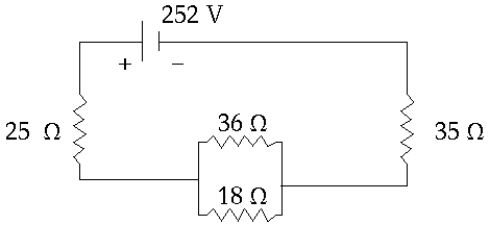 In the circuit shown, the power dissipated in the 18- resistor is
In the circuit shown, the power dissipated in the 18- resistor isA) 0.15 kW
B) 98 W
C) 33 W
D) 0.33 kW
E) 47 W

Unlock Deck
Unlock for access to all 160 flashcards in this deck.
Unlock Deck
k this deck
78
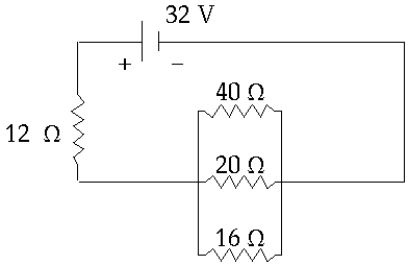 In this circuit, the current I through the battery is approximately
In this circuit, the current I through the battery is approximatelyA) 1.7 A
B) 4.4 A
C) 0.36 A
D) 0.60 A
E) 3.4 A

Unlock Deck
Unlock for access to all 160 flashcards in this deck.
Unlock Deck
k this deck
79
A 12-V battery has an internal resistance of 0.20 . If the battery is being charged by a current of 30 A, the magnitude of the potential difference between its terminals is
A) 18 V
B) 6.0 V
C) 42 V
D) 0
E) 12 V
A) 18 V
B) 6.0 V
C) 42 V
D) 0
E) 12 V

Unlock Deck
Unlock for access to all 160 flashcards in this deck.
Unlock Deck
k this deck
80
Two resistors are connected in parallel across a potential difference. The resistance of resistor A is twice that of resistor B. If the current carried by resistor A is I, what is the current carried by B?
A) I
B) 2I
C) I/2
D) 4I
E) I/4
A) I
B) 2I
C) I/2
D) 4I
E) I/4

Unlock Deck
Unlock for access to all 160 flashcards in this deck.
Unlock Deck
k this deck


